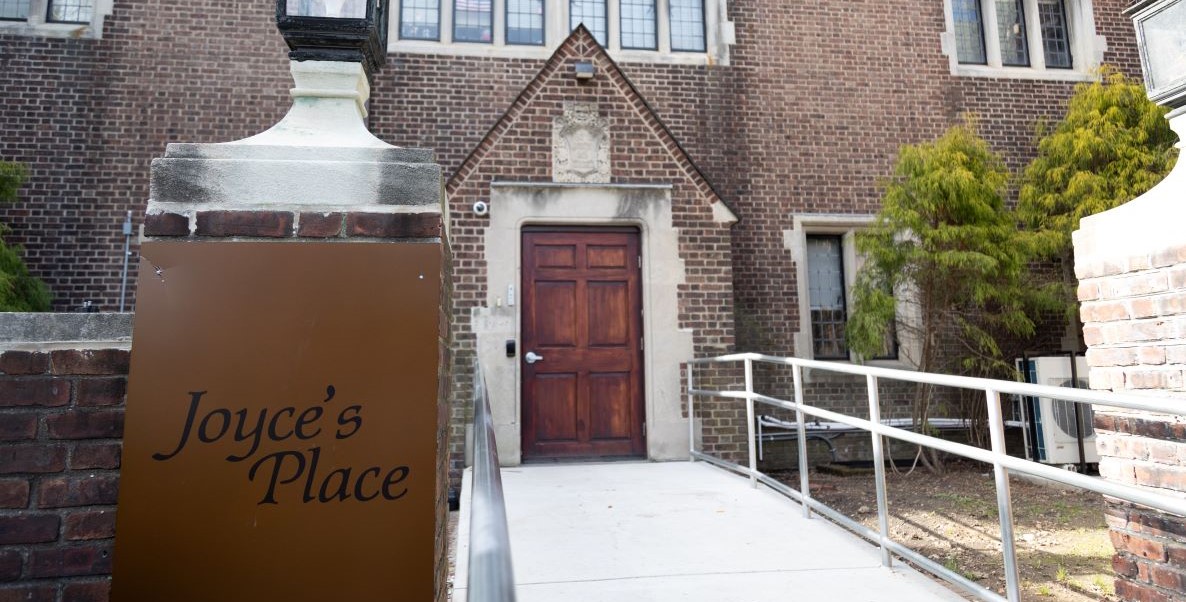The first thing you notice is the quiet.
Entering the doors of Joyce’s Place, Project HOME’s new safe haven for women experiencing homelessness, feels a bit like entering a student center at a liberal arts college. The building, overlooking the bucolic Bala Golf Club, is a restored red-brick mansion from 1927, with charming archways and heavy wooden doors. Above the entrance, a Shakespeare inscription reads “see the players well bestowed” — fitting, given that the building was originally a retirement home for actors, their names still preserved on bedroom doors.
Sunlight pours through large, double-paned windows in the community room, filled with couches and an exercise bike, a large flat-screen TV and a piano. Trees blow in the breeze outside the cafeteria which, with its funky overhead light fixtures and flower vases, looks more like a coffee shop than an institutional lunchroom. Birds flit about and a groundhog chases its tail in the expansive yard, where staff and residents hope to plant a garden.
On the western edge of the city and Fairmount Park, Joyce’s Place feels worlds away from the urban bustle of Philadelphia, where on any given night approximately 900 single, adult women experience homelessness.
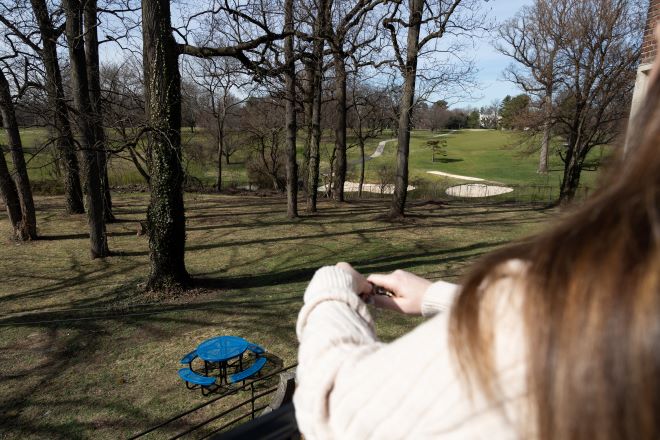
Joyce’s Place, which replaces Project HOME’s Women of Change building at 20th and Arch streets, was designed to be homey, yes, but it was also designed with intention. The home focuses on women with mental health challenges, disabilities, and substance use disorder — issues that are amplified among people who are homeless. There’s a private room for medicine management, and private offices for case managers, who connect residents to public assistance benefits and help them generate timelines of attainable goals.
Soon, there will be a designated exam room for the visiting nurse and psychiatrist. You don’t have to be sober to stay at Joyce’s Place, but you can’t use drugs onsite; still, there are safe needle disposal boxes, and a Naloxone station on every floor. Recognizing the rise in seniors and young people with disabilities experiencing homelessness, the building is wheelchair accessible, with ramps and an elevator to the second floor — a feature that’s not universal across all city shelters.
The three-story building opened its doors in late January and is already at full capacity, with 25 women occupying a mix of singles, doubles and a few congregant rooms for when they first arrive. (Women arrive through Project HOME’s outreach workers; they cannot come in off the street.) Residents receive critical wraparound services: visits from a nurse, a podiatrist, and a psychiatrist; help securing legal IDs and documentation for work and housing; connections to employment opportunities within Project HOME’s job programs — like its candle-making business, bookshop and Fairmount-based thrift store.
The goal is for Joyce’s Place residents to use the home as a needed launching pad to heal and set themselves up for success. “My hope is that they move on to the next journey, which may be employment, it may be housing,” says Corrie Decker, Joyce’s Place’s senior program manager. “I want this to be a stepping stone and for them to take advantage of that. They have a foundation where they have a place to lay their head every night, they get three meals, so when they wake up in the morning, they can utilize their time for their next steps.”
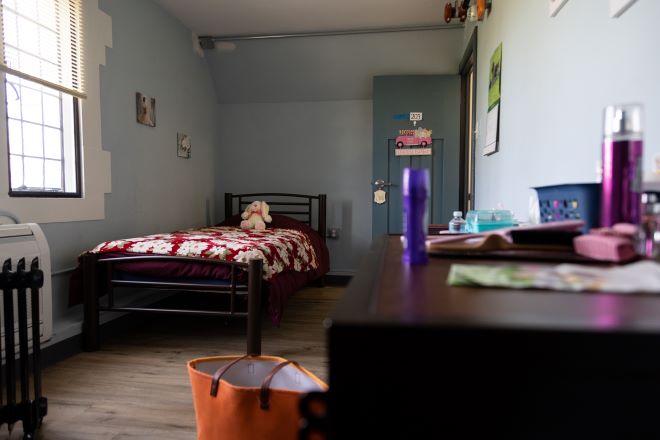
Seeing homelessness as a health issue
Homelessness in Philadelphia is on the rise, with the 2023 official count noting twice as many unhoused women as men in the city. Unhoused people of any gender are twice as likely to have unmet medical needs; some 30 percent suffer from mental illness; many also have substance abuse issues. As a population, folks experiencing chronic homelessness on average live 20 years less than those with homes.
And women face a unique set of obstacles: They are more vulnerable to victimization, sexual assault, and violence. The lack of access to preventive medical care means that those who are pregnant don’t receive proper prenatal care. One study out of Massachusetts found that pregnant homeless women were twice as likely to experience a birth complication. Some women even give birth on the street, putting their babies at higher risk of health problems.
The American College of Obstetricians and Gynecologists (ACOG) recognizes the role and toll of health when it comes to homelessness, supporting efforts like modifying residency and medical student coursework both to increase awareness of health care issues of homeless individuals and promote involvement in direct care; and they promote professional liability protection for physicians who volunteer their services to homeless individuals.
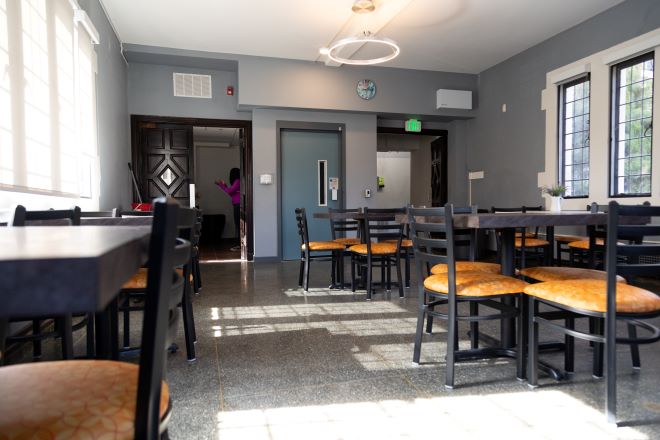
What’s more, practitioners recognize that illness is often the root cause of homelessness — whether addiction, or a mental health issue, or an injury that leads to the loss of a job and, with it, the health insurance most Americans still get through their workplace. That’s why some call for viewing homelessness through the lens of healthcare — and combating it with a holistic approach that includes the kinds of services Joyce’s Place, on its small scale, offers. Other programs, like CHOP’s Homeless Health Initiative, address the multifaceted nature of homelessness, sending volunteers to families living in local emergency housing shelters, for example, to offer high-quality medical and dental care, and health education.
While typical shelters provide a place for individuals to sleep at night, they usually require people to leave in the morning and remain off site during the day. But safe havens like Joyce’s Place offer 24-hour access to residents, providing a safe and stable environment for women, including transgender women, to feel comfortable.
The goal is for Joyce’s Place residents to use the home as a needed launching pad to heal and set themselves up for success. “My hope is that they move on to the next journey, which may be employment, it may be housing,” says Corrie Decker, Joyce’s Place’s senior program manager.
More so than at Project HOME’s previous women’s shelter, which first opened its doors in 1997, the women here receive privacy — most of the rooms, which come outfitted with warm burgundy comforters and soft blue sheets, are singles — and the sense of dignity that comes with having one’s own space.
The women living there currently range in age from 21 to 80 and reflect a mix of races and education levels: Some have college and advanced degrees; others haven’t completed high school. Unlike at most facilities, residents can stay as long as they’d like, though caseworkers strive to help them work towards employment and permanent housing.
Funded by Pierce and Katie Keating, among other donors like The William Penn Foundation, the building’s name honors a longtime Project HOME volunteer, the late Joyce Moran. Its opening comes at a crucial time, as earlier this month HUD announced funding cuts for some safe havens; facilities with less robust financial support will likely have to shutter doors, but Project HOME — whose co-founders The Citizen recently named Citizens of the Year — are committed to finding other resources. In another potential blow to women, the Parker administration this month also reversed a decision by the former Kenney administration to provide “tiny homes” to women over 55 who are experiencing homelessness.
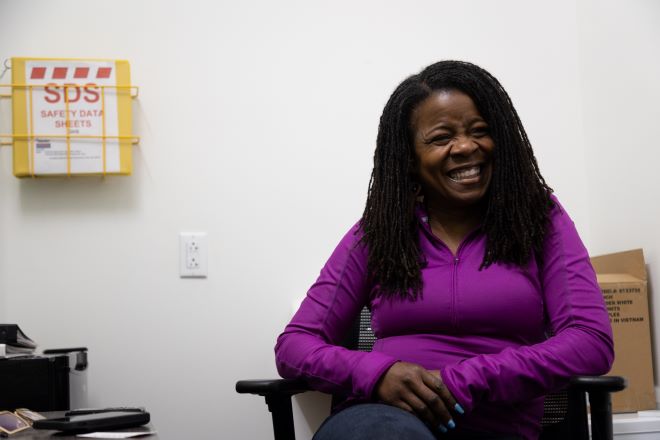
But if the key to ending homelessness is taking a holistic, integrated approach that prioritizes health, the Parker administration could be on the right track: Recently, according to Cheryl Hill, Project HOME’s senior vice president of Supportive Housing Operations, the mayor’s team convened a meeting of players across sectors — insurers, hospitals, relief agencies, and service providers — to get in the same room, and on the same page.
It was a promising step, says Hill; it supports Project HOME’s approach, as exemplified in Joyce’s Place, that ending and preventing homelessness is not a one-size-fits-all issue — and that women experiencing homelessness face challenges that require targeted, multifaceted — and compassionate, dignified — interventions.
This piece is part of a year-long editorial series looking at innovations to address inequities in women’s healthcare, sponsored by Independence Blue Cross.

![]() MORE ON CLOSING THE HEALTH DIVIDE
MORE ON CLOSING THE HEALTH DIVIDE



